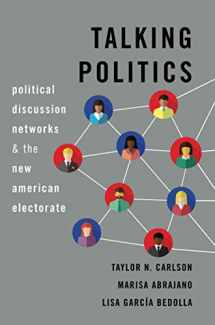
Talking Politics: Political Discussion Networks and the New American Electorate
Book details
Summary
Description
Review
"...engaging..." -- Journal of Economic Literature
"While the book will be of primary interest to political scientists, its insights about the socially constituted nature of political opinion and the diversity of the American electorate will inform anyone trying to understand the dynamics of contemporary US politics. Recommended. Graduate students and faculty." -- N. Zaretsky, The University of Alabama at Birmingham, CHOICE
"Drawing from a rich new dataset on political conversations among Latinx, Black, Asian American, and White Americans, this book enriches our understanding of the dynamics of discussion networks and political engagement. This is essential reading for anyone interested in how Americans talk to one another about politics, and what impact these conversations have on elections." -- Jane Junn, University of Southern California
"The authors challenge traditional studies of political behavior by analyzing original data that considers the diversity of networks-and political conversations in particular-for understanding what citizens believe and do. The authors demonstrate that the influence of informal conversation varies across ethno-racial groups, highlighting the critical importance of integrating the changing diversity and communication patterns of the mass public as fundamental features of our research.ÂAn interesting and invaluable study of political behavior in the U.S. today." -- Jan E. Leighley, American University
"This book offers a critical new perspective on the study of political communication and networks by centering the social contexts that shape who we talk to in our everyday lives. The authors make a compelling case about how politics is a function of lived community and how we experience it through racialized interactions with others. They offer a lively, informed assessment of how the effects of these discussions varies across groups." -- Janelle S. Wong, University of Maryland, College Park
Over five decades of research has made clear that social networks can have an important impact on our political behavior. Specifically, when we engage in political conversation within these networks we develop connections that increase the likelihood that we will become politically active. Yet, most studies of political behavior focus on individuals, rather than the effects of networks on political behavior. Furthermore, any studies of networks have, by and large, been based on White Americans. Given what we know about the ways in which neighborhood, cultural, friend, and family networks tend to segregate along ethnic and racial lines, the authors of this book argue that we can assume that political networks segregate in much the same way.
This book draws on quantitative and qualitative analyses of 4000 White American, African American, Latino, and Asian American people to explore inter and intra-ethnoracial differences in social network composition, size, partisanship, policy attitudes, and homophily in political and civic engagement. The book thus makes three key contributions: 1) it provides, for the first time, detailed comparative analysis of how political networks vary across and within ethnoracial groups; 2) demonstrates how historical differences in partisanship, policy attitudes, and engagement are reflected within groups' social networks; and, 3) reveals the impact that networks can have on individuals' political and civic engagement.


We would LOVE it if you could help us and other readers by reviewing the book
Book review



